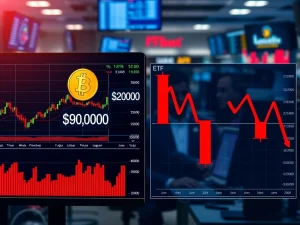Fed’s Independence Under Fire: Bessent’s Controversial Tariffs Unveil New Economic Policy Era

In the ever-evolving world of finance, where every policy shift sends ripples across global markets, a significant debate is brewing that could reshape not just traditional finance but also indirectly influence the cryptocurrency landscape. US Treasury Secretary Scott Bessent’s recent, powerful remarks have ignited a firestorm, challenging the very notion of the Fed’s Independence and proposing a radical overhaul of US trade policy. How will these high-stakes moves impact your portfolio and the broader economic outlook?
Unpacking Scott Bessent’s Bold Economic Vision
US Treasury Secretary Scott Bessent has stepped into the limelight with a series of high-stakes declarations that underscore a broader push to reassert executive influence over financial governance. At the heart of his strategy lies a proposed 15% tariff on Japanese automobiles. This isn’t just about protecting domestic car manufacturers; Bessent frames this new trade agreement with Japan as a cornerstone of his strategy to bolster US strategic industries through a collaborative financing mechanism. The goal is clear: stimulate US production and reduce reliance on foreign supply chains.
However, Bessent’s vision extends beyond bilateral agreements. He acknowledges the intricate dance of negotiations with the European Union, citing the “problem of joint action” among its 27 member states as a significant hurdle. Looking further east, his upcoming meeting with Chinese counterparts signals a potential “big, beautiful rebalancing” of trade dynamics, where the US focuses on production and China on consumption. While details remain unconfirmed, hints of a new purchasing agreement, reminiscent of the Trump-era Phase One deal, suggest a significant shift in US Trade Policy.
The Clash Over Fed’s Independence: A Critical Juncture?
Perhaps the most controversial aspect of Bessent’s recent statements targets the Federal Reserve. He has openly accused the central bank of allowing “political bias” to influence its economic projections. This isn’t a minor critique; Bessent is calling for an internal review of the Fed’s non-core operations, specifically mentioning bank supervision and tariff-related analyses. His argument is that the Fed’s growing involvement in areas beyond its traditional monetary policy mandate risks eroding its independence and credibility.
While Bessent stopped short of demanding Chair Jerome Powell’s resignation, he did criticize Powell’s leadership for not proactively addressing these issues. He suggested that the Fed’s current trajectory could undermine public trust in its neutrality. This public challenge to the Fed’s Independence highlights the delicate balance between regulatory oversight and institutional autonomy, especially as the central bank’s mandates continue to expand in an increasingly complex global economy.
Redefining US Trade Policy: A Global Rebalancing Act
Bessent’s focus on international trade goes hand-in-hand with his domestic agenda. The proposed 15% tariff on Japanese autos is a clear signal of an aggressive shift in US Trade Policy, prioritizing domestic manufacturing and job creation. This move is part of a larger strategy to incentivize production within the United States, fostering a more resilient economy less vulnerable to global supply chain disruptions.
Key aspects of this evolving trade strategy include:
- Japan Agreement: A collaborative financing mechanism alongside the tariff to support US strategic industries. This aims to create a mutually beneficial relationship focused on domestic production.
- European Union Challenges: The inherent complexity of negotiating with 27 diverse member states presents a unique barrier to swift progress on new trade agreements.
- China Rebalancing: A significant pivot towards discussions focused on the US leading production and China emphasizing consumption, potentially echoing past agreements like the Phase One deal.
The success of these initiatives hinges on the willingness of international partners to adapt to these new dynamics and the commitment to proposed collaborations.
Market Reactions and the Future of Economic Policy
Market reactions to Bessent’s remarks have been notably mixed, creating a ripple of uncertainty. Treasury yields ticked higher as traders recalibrated their expectations for the Fed’s upcoming policy decisions. This uptick reflected palpable concerns that the Treasury’s criticisms could pressure the central bank to adjust its stance, potentially impacting interest rates and investment strategies.
Analysts generally support transparency in the Fed’s decision-making process. However, many warn that the proposed investigations risk politicizing an institution designed to operate independently of political influence. Bessent’s emphasis on institutional conduct, rather than immediate inflation control or rate-cutting, further complicated market interpretations of his priorities. The broader implications extend to the Biden administration’s push to assert authority over Economic Policy, setting a precedent for future interactions between the Treasury and the Federal Reserve.
What Does This Mean for the Treasury Secretary’s Role?
The assertive stance taken by Treasury Secretary Bessent marks a significant moment in the ongoing dialogue between the executive branch and the nation’s central bank. His public clashes with the Fed highlight a delicate and often tense balance between regulatory oversight and institutional independence. Critics caution that such perceived overreach could dilute the Fed’s crucial focus on its core mandates of price stability and maximum employment.
Conversely, proponents argue that enhanced scrutiny is necessary to ensure accountability, especially in an era of rapidly evolving economic challenges and expanded central bank responsibilities. Bessent’s actions signal a clear intention to shape economic governance more directly, potentially leading to a new era where the lines between fiscal and monetary policy become increasingly blurred. The coming months will reveal the true impact of these bold proposals on both domestic industries and global trade relations.
Conclusion
Treasury Secretary Scott Bessent’s recent proposals for tariffs on Japanese autos and his sharp criticisms of the Federal Reserve’s independence have ignited a profound debate. These moves signal a determined effort to reshape US economic and trade policy, aiming to bolster domestic industries and rebalance global trade dynamics. While proponents argue for enhanced accountability and strategic shifts, critics warn of the potential politicization of the Fed and the delicate balance required for institutional autonomy. The unfolding narrative between the Treasury and the Federal Reserve, coupled with significant shifts in international trade strategy, will undoubtedly have far-reaching implications for global markets and the very structure of economic governance.
Frequently Asked Questions (FAQs)
What is Treasury Secretary Scott Bessent proposing regarding Japanese autos?
Treasury Secretary Scott Bessent has proposed a 15% tariff on Japanese automobiles. This measure is part of a broader strategy to stimulate US production and support strategic domestic industries through a collaborative financing mechanism.
Why is the Federal Reserve’s independence being debated?
The Federal Reserve’s independence is being debated because Secretary Bessent has accused the central bank of allowing “political bias” to influence its economic projections. He has called for an internal review of the Fed’s non-core operations, arguing that its involvement in areas beyond monetary policy risks eroding its credibility and autonomy.
How might these trade policies affect consumers?
Proposed tariffs on Japanese autos could potentially lead to higher prices for imported vehicles in the US, impacting consumer purchasing power. Conversely, the push to stimulate domestic production aims to create jobs and potentially offer more locally manufactured options in the long term, though immediate consumer impact is often higher costs.
What are the potential market reactions to Bessent’s statements?
Market reactions have been mixed. Treasury yields rose as traders adjusted expectations for the Fed’s policy decisions, reflecting concerns that the Treasury’s criticisms could pressure the central bank. Analysts note that while transparency is supported, the proposed investigations risk politicizing the Fed, leading to market uncertainty.
What is the “problem of joint action” regarding the EU?
The “problem of joint action” refers to the inherent difficulty and complexity of negotiating trade agreements or other policy initiatives with the European Union, given that it comprises 27 sovereign member states, each with its own interests and priorities, requiring extensive consensus-building.
How does this impact the broader economic policy of the Biden administration?
Bessent’s statements highlight the Biden administration’s push to assert greater authority over economic policy. His public clashes with the Fed underscore the delicate balance between executive oversight and institutional independence, potentially leading to a more assertive role for the Treasury in shaping economic direction.









